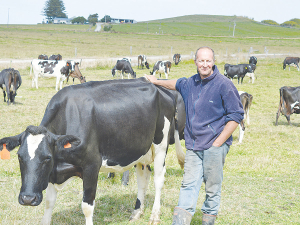ACT MP and Northland dairy farmer Mark Cameron is lodging a new member’s bill that would prevent regional and district councils from regulating greenhouse gas emissions.
Cameron’s Resource Management (National and Regional Emissions) Amendment Bill aims to restore longstanding provisions to the Resource Management Act that prohibit regional councils from considering climate change as a factor in their plans.
"It’s about getting local government back to basics and stopping councils feeling like they need to supress local productive activity like farming for the sake of the planet,” says Cameron.
Federated Farmers has welcomed the bill, saying it will largely reinstate changes made in 2004 that were then repealed in 2020 by the previous Government.
Cameron points out that currently, councils can use the RMA to impose a patchwork of restrictions on the way Kiwis use their land, all in the name of reducing emissions.
“This was the result of amendments to the RMA progressed under the previous Government. Property rights were sacrificed to the climate gods, in a way that wouldn’t even reduce net emissions.
"It’s not feasible to have regional councils trying to save the world’s climate. In fact, it’s hopeless, because emissions are already managed nationally under the Emissions Trading Scheme. If one council cracks down on emissions, it just pushes carbon-intensive activity someplace else. And councils aren’t equipped to consider carbon offsets that businesses might have in other parts of the country.”
He points out that ACT has long said the most cost-effective way to manage emissions is through nationally co-ordinated carbon pricing, technological innovation, and international action – not complex land use restrictions via the RMA.
“This bill is just another way to allow farmers and people working on the land to get on with what they do best, without needless layers of bureaucracy and council diktats."
Federated Farmers’ RMA reform spokesperson Mark Hooper says that greenhouse gas emissions are a global rather than local challenge.
“It has never made sense for local councils to individually regulate greenhouse gas emissions," says Hooper.
"On top of this, New Zealand has a number of national policies regulating greenhouse gas emissions, meaning any local policy duplicates what central government is already doing."
Hooper believes that having regional councils regulate greenhouse gas emissions has the potential to create huge headaches for farmers.
He points out that the Greater Wellington Regional Council (GWRC) has proposed a target of a 50% reduction in all greenhouse gas emissions by 2030, including biogenic methane.
"This diverges from the central Government targets that treat short-lived biogenic methane differently to long-lived carbon dioxide,” says Hooper.
"For Wairarapa farmers, who sit inside the GWRC’s boundaries, this means a resource consent application could set conditions that require farmers to reduce emissions in line with the 50% target.
"It raises questions for all resource consent applications. For example, could a new road or house fail a resource consent application if it wasn’t viewed as consistent with a 50% reduction?"
Hooper says none of this makes any sense when carbon dioxide emissions are already captured under the ETS.
"Preventing activities that emit carbon dioxide in Wellington will simply mean more of the ETS cap is available for other regions.
"While agricultural emissions aren’t in the ETS, this is for good reason. Economic modelling has shown it would reduce sheep and beef production by over 20% by 2030, for a much less ambitious target.
"With 39% of the Wellington region’s greenhouse gas emissions coming from agriculture, achieving a 50% reduction in regional emissions in just over five years’ time could mean huge conversion of farmland to forestry.”
Hooper says Cameron’s bill is sensible policy that reinstates law that was supported by both the Clark and Key governments for 16 years.
"I encourage all political parties to once again support this sensible law change.”



















